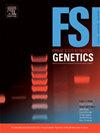Inter-platform evaluation of the MPSplex large-scale tri-allelic SNP panel for forensic identification
IF 3.2
2区 医学
Q2 GENETICS & HEREDITY
引用次数: 0
Abstract
MPSplex is a large-scale forensic massively parallel sequencing (MPS) panel with 1,270 tri-allelic SNPs, 44 microhaplotypes (MH) and 55 ancestry-informative bi-allelic SNPs (aiSNPs) designed for missing persons identification. We have evaluated MPSplex with the most widely used MPS platforms in the forensic field: the Illumina MiSeq, the Thermo Fisher Scientific Ion S5 and the Qiagen GeneReader. The tri-allelic SNPs of MPSplex were previously identified from the most polymorphic loci with three common alleles in 1000 Genomes Phase III data and combined with the 44 MH and 55 aiSNPs, then implemented into a QIAseq Targeted DNA Custom Panel (Qiagen), a marker panel which uses Unique Molecular Indices or UMIs. The UMI random-sequence DNA molecules are incorporated onto DNA fragments before the Target Enrichment PCR, allowing the identification of reads that originated from the same template and consequently they can be used to correct the errors that may arise within the PCR or the sequencing process. In this study, we present the results of an inter-platform evaluation of the MPSplex panel, characterizing its performance in different forensic scenarios, which assessed aspects that include sensitivity, genotyping accuracy and mixture analysis. MPSplex aims to provide a tool designed for kinship analysis that can be applied beyond the resolution of first- or second-degree relationships, avoiding the need for much bigger forensic panels designed for genealogy purposes, which usually require significantly more sequencing resources. This study provides evaluation of MPSplex using the MPS systems in routine use for forensic genotyping of large-scale panels of SNPs.
MPSplex大规模三等位基因SNP面板法医鉴定的跨平台评估
MPSplex是一种大规模法医大规模平行测序(MPS)面板,具有1,270个三等位基因snp, 44个微单倍型(MH)和55个祖先信息双等位基因snp (aiSNPs),设计用于失踪人员识别。我们用在法医领域最广泛使用的MPS平台对MPSplex进行了评估:Illumina MiSeq、Thermo Fisher Scientific Ion S5和Qiagen generader。MPSplex的三等位基因snp先前从1000 Genomes III期数据中具有三个共同等位基因的最多多态性位点中鉴定出来,并与44个MH和55个aiSNPs结合,然后将其应用于QIAseq Targeted DNA Custom Panel (Qiagen),这是一个使用Unique Molecular Indices (UMIs)的标记面板。UMI随机序列DNA分子在目标富集PCR之前被整合到DNA片段上,允许识别来自相同模板的读取,因此它们可用于纠正PCR或测序过程中可能出现的错误。在这项研究中,我们展示了MPSplex面板的跨平台评估结果,表征了其在不同法医场景中的性能,评估了包括敏感性、基因分型准确性和混合分析在内的方面。MPSplex旨在提供一种专为亲属关系分析而设计的工具,该工具可以应用于超越一级或二级关系的解决方案,避免需要为家谱目的而设计的更大的法医小组,这通常需要更多的测序资源。本研究提供了MPSplex的评估使用MPS系统在常规使用的大规模snp面板法医基因分型。
本文章由计算机程序翻译,如有差异,请以英文原文为准。
求助全文
约1分钟内获得全文
求助全文
来源期刊
CiteScore
7.50
自引率
32.30%
发文量
132
审稿时长
11.3 weeks
期刊介绍:
Forensic Science International: Genetics is the premier journal in the field of Forensic Genetics. This branch of Forensic Science can be defined as the application of genetics to human and non-human material (in the sense of a science with the purpose of studying inherited characteristics for the analysis of inter- and intra-specific variations in populations) for the resolution of legal conflicts.
The scope of the journal includes:
Forensic applications of human polymorphism.
Testing of paternity and other family relationships, immigration cases, typing of biological stains and tissues from criminal casework, identification of human remains by DNA testing methodologies.
Description of human polymorphisms of forensic interest, with special interest in DNA polymorphisms.
Autosomal DNA polymorphisms, mini- and microsatellites (or short tandem repeats, STRs), single nucleotide polymorphisms (SNPs), X and Y chromosome polymorphisms, mtDNA polymorphisms, and any other type of DNA variation with potential forensic applications.
Non-human DNA polymorphisms for crime scene investigation.
Population genetics of human polymorphisms of forensic interest.
Population data, especially from DNA polymorphisms of interest for the solution of forensic problems.
DNA typing methodologies and strategies.
Biostatistical methods in forensic genetics.
Evaluation of DNA evidence in forensic problems (such as paternity or immigration cases, criminal casework, identification), classical and new statistical approaches.
Standards in forensic genetics.
Recommendations of regulatory bodies concerning methods, markers, interpretation or strategies or proposals for procedural or technical standards.
Quality control.
Quality control and quality assurance strategies, proficiency testing for DNA typing methodologies.
Criminal DNA databases.
Technical, legal and statistical issues.
General ethical and legal issues related to forensic genetics.

 求助内容:
求助内容: 应助结果提醒方式:
应助结果提醒方式:


